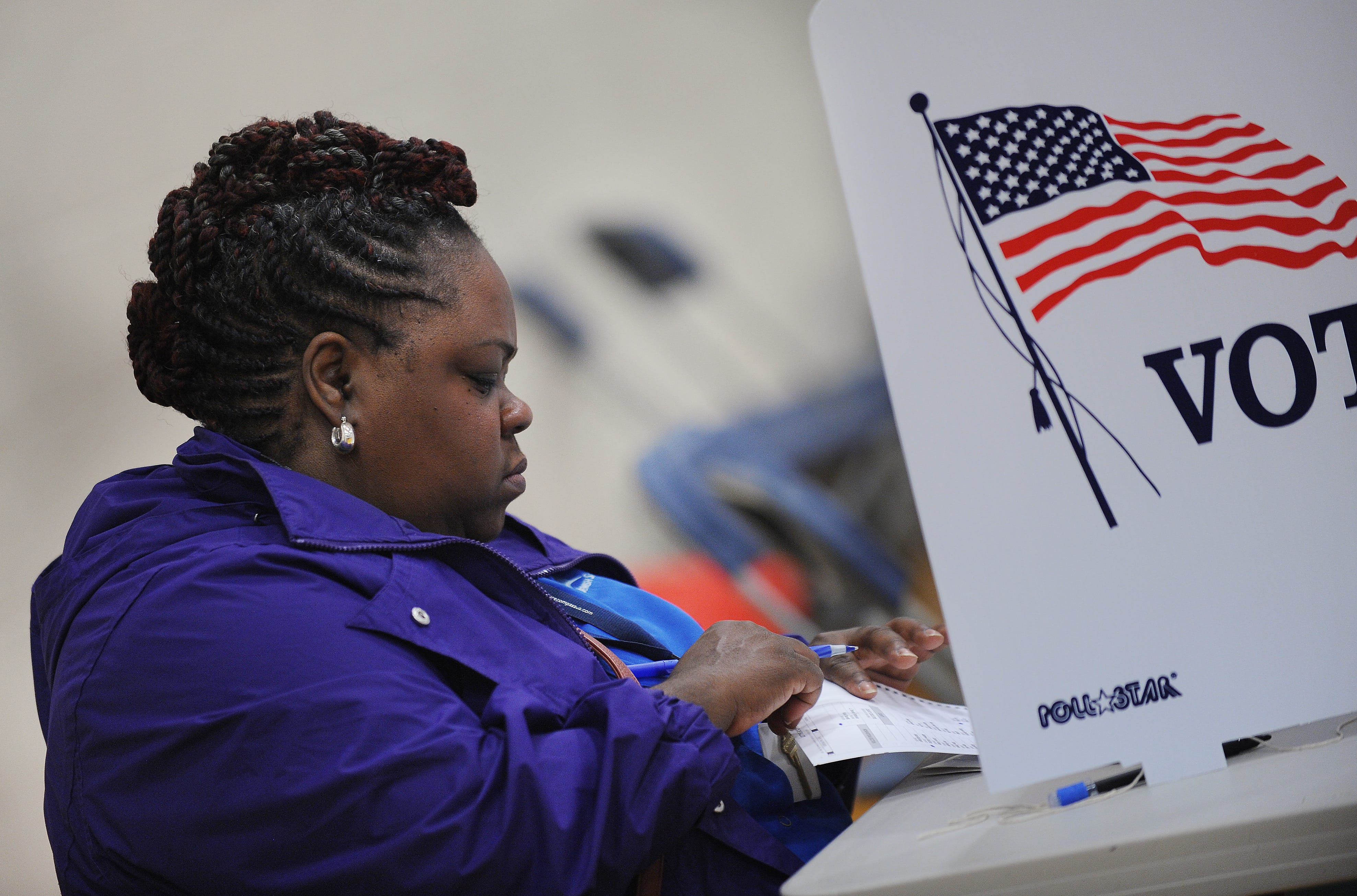Straight-ticket ban helped Michigan GOP 'at the margins'
 Jonathan Oosting
Jonathan Oosting
Lansing — Michigan’s temporary ban on straight-party voting marginally benefited down-ticket Republicans in this year's election, but not enough to overcome a strong performance by Democrats, according to a Detroit News analysis.
The ban, approved by the GOP-led Legislature in late 2015, was overturned through voter passage of Proposal 3, which will restore straight-party voting for future elections and preserve the option in the Michigan Constitution.
Gov.-elect Gretchen Whitmer won her race by 9 percentage points, but Democrats won other statewide contests by narrower margins and lost a handful of critical legislative races to Republicans, who maintained majorities in the state House and Senate.
Experts said the straight-ticket ban likely led to more ticket splitting, and unofficial results show a larger percentage of voters skipped lower-profile races, choosing to not complete their full ballots. That down-ballot drop-off had a larger negative impact on Democratic candidates, who traditionally have benefited from straight-party voting.
Democrats elected to the state Board of Education, Judith Pritchett and Tiffany Tilley, got 21 percent fewer votes than Whitmer. By contrast, Democrats who ran for education board posts four years ago received 9 percent fewer votes than gubernatorial nominee Mark Schauer.
Republican state board candidates Tami Carlone and Richard Zeile got 17 percent fewer votes than gubernatorial nominee Bill Schuette last week, a smaller drop-off than GOP candidates experienced in the 2014 midterm.
Those trends were consistent across elections for governing board positions at the University of Michigan, Michigan State University and Wayne State University. In all three contests, voter drop-off appeared to have a larger impact on Democratic candidates than it did in 2014, while the impact on GOP candidates lessened.
“That was the Republican goal,” said Mark Brewer, former chairman of the Michigan Democratic Party, who unsuccessfully sued to keep the straight-party option in place. “Democrats used straight-ticket voting more than Republicans, about a 60-40 ratio in the state overall, so you would expect the drop-off would be worse for Democrats.”
But Democrats still managed to sweep statewide education seats, and outside experts say it’s difficult to determine how large of a role the straight-ticket ban played in the outcome. More than 4.3 million Michigan voters cast ballots, the highest number on record for a midterm election.
"Record-high turnout would indicate people were ready to vote whether they had straight-ticket or not,” said Sarah Anderson, deputy chief of staff for the Michigan Republican Party.

The Michigan GOP hasn’t finished reviewing returns, but Anderson said the straight-ticket ban did not appear to have a large impact. Major party state Board of Education candidates received significantly more votes than four years ago, but the combined drop-off from the gubernatorial race rose from 16 percent in 2014 to 20 percent in 2018.
Strong voter turnout likely “mitigated” any major partisan effect from the straight-ticket ban, said Michigan Democratic Party Chairman Brandon Dillon.
“I don’t think we saw the negative impact this time around, at least on the surface, that we anticipated,” he said.
Republican lawmakers voted to end straight-ticket voting in 2015, arguing that asking voters to consider each candidate individually would encourage a more informed electorate. A legal challenge kept the option in place for 2016.
Ironically, GOP candidates in some parts of the state benefited from straight-ticket voting in 2016 when President Donald Trump narrowly won the state, becoming the first Republican to do so since 1988. A Republican won the county clerk's race in Macomb County that Democrats had dominated for decades.
Two years later, Democrats won the top of the ticket and swept other statewide races, which is exactly “what you’d expect even if there was straight-ticket,” said Brian Began, a GOP consultant with the bipartisan firm Grassroots Midwest.
While some Republicans who strayed in the governor’s race may have “come home a bit down ticket,” voters with strong partisan leanings typically vote for their party’s candidate anyway, Began said. “It’s a time-saver.”
Most voters “did what they were going to do in a wave year, they either voted straight Democrat or straight Republican,” he said.
But there were some parts of the state where the straight-party ban “hurt Democrats at the margins,” said Adrian Hemond, a Democratic consultant at Grassroots Midwest.
He pointed to races like Mid-Michigan’s 24th Senate District, where Democrat Kelly Rossman-McKinney lost to Republican state Rep. Tom Barrett by 10 percentage points.
“I don’t know that Kelly Rossman was likely to win either way, but Gretchen Whitmer performed much better in Eaton County than Kelly did, and Kelly needed to run up the score in Eaton County to win that race,” Hemond said.
He also noted the 91st state House race in Muskegon County, where Republican Greg VanWoerkom defeated Democrat Tanya Cabala by 11 points in a district Whitmer carried.
“That’s an instance where I think it hurt Democrats quite a bit,” Hemond said. “VanWoerkom is a pretty good name there. For a lot of Democrats, if they’d been going in and just casting a straight-ticket ballot, they wouldn’t have looked through to see that VanWoerkom name.”
Ticket-splitting is more common near the top of the ballot in higher-profile races where voters are more likely to know the candidates. While it’s not clear how large a role the straight-ticket ban had in their races, Republican U.S. Senate candidate John James and attorney general nominee Tom Leonard both got more total votes than Schuette and lost by narrower margins.
Democratic Attorney General-elect Dana Nessel defeated Leonard by less than 3 points. Incumbent Sen. Debbie Stabenow, D-Lansing, beat James by 6.5 points.
In certain counties, “Schuette way under-performed, but a lot of these folks who are probably typically Republican came back to vote for Leonard and James,” Began said.
Democrats who opposed the straight-ticket voting ban warned that eliminating the time-saving option could lead to longer lines on Election Day. But any long lines on Nov. 6 were likely the result of record turnout, Anderson suggested.
The Michigan Secretary of State’s Office has not yet reviewed how the elimination of straight-ticket voting may have affected wait times. In Detroit, the state’s largest city, Elections Director Daniel Baxter said clerks worked proactively to mitigate any impact.
To speed up in-person voting, Detroit had one voting booth for every 100 voters, up from one booth for every 300 voters in past elections, Baxter said. The city also sent election instructions and sample ballots to voters so voters knew what to expect when they entered the voting booth.
“We had long lines all over the city; however, voters were very patient,” Baxter said. “No one left the lines because it took them too long to vote. I think people just understood that they were going to have to deal with that for this particular election.”
Nearly 70 percent of voters supported Proposal 3, which will restore the straight-ticket voting option for future elections and make several other reforms, including the addition of same-day voter registration and no-reason absentee voting.
Straight-ticket voting, which Republicans argue is a holdover from the days of party bosses, is becoming increasingly rare. Only eight other states currently allow the option, which is expected to end in Texas starting in 2020, according to the National Conference of State Legislatures.
joosting@detroitnews.com
(517) 371-3662
Twitter: @jonathanoosting